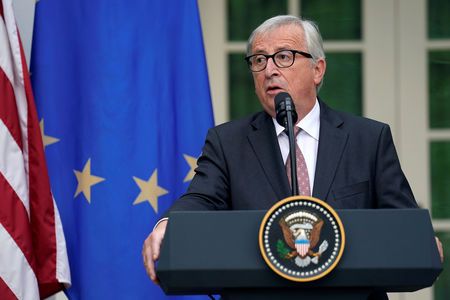STRASBOURG (Reuters) - European Commission President Jean-Claude Juncker will say on Wednesday that Britain should not expect EU negotiators to soften demands as they try to conclude a Brexit divorce treaty but he will reaffirm an offer of a close future partnership, a senior EU official said.
The EU chief executive will touch only briefly on Britain’s impending withdrawal from the bloc in a keynote State of the European Union address to the European Parliament, he said.
And he dismissed suggestions that EU leaders might rejig their instructions for chief negotiator Michel Barnier when they meet May in Austria next week as both sides try to conclude a treaty that can be ratified by the two parliaments well ahead of March 29 when Britain is due to leave the EU, deal or no deal.
Among the toughest issues left to solve is how to avoid a disruptive new UK-EU land border on the island of Ireland.
To suggest there is a softening of the EU position was to give a “wrong signal”, said the official, who is close to the negotiations. Brussels and the member states remained united and determined to resist British ideas they fear would let it keep some benefits of the EU single market while avoiding the costs.
He also dismissed any suggestion that Britain’s exit could be delayed beyond March 29 to avoid a disruptive “hard Brexit”. Postponement was “not in the real world”, he said. Some in the EU fear talk of delay may take pressure off to reach an accord.
At the same time, the EU official said, Juncker would note that Britain and the EU have cooperated closely on global issues, including in recent disputes with Russia and with the United States over trade and climate change policy, and he would repeat Brussels’ offer to continue such a close partnership.
The EU welcomes May’s proposal for a very close free trade agreement, the official said, and Juncker would stress that while Britain would become, in EU parlance, a “third country”, clearly outside the bloc, “the UK will never be an ordinary third country for the EU”.








